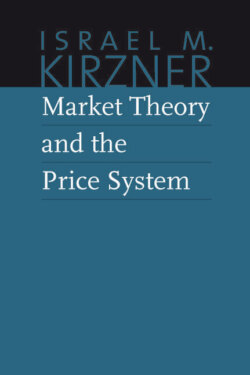Читать книгу Market Theory and the Price System - Israel M. Kirzner - Страница 17
На сайте Литреса книга снята с продажи.
MARKET THEORY, ECONOMIC THEORY, AND ECONOMICS
ОглавлениеWe are now in a position to state how the subject matter of this book relates to economic theory as a whole and, even more generally, to the entire discipline of economics.
The theory that we study in this book makes up the core of economic theory, but by no means exhausts it. We investigate here the structure and operation of a market economy in its broadest theoretical outline; and it is within this general body of theory that most other branches of economic theory find their place. We are provisionally able to refrain from paying attention to these other branches of theory only by drastically simplifying the hypothetical market economy we deal with. Once the theory of the simplified market process has been mastered, then more complex and particular market situations can be dealt with by logical extensions of the theory.
In our study, for example, we ignore the possibility of trade between two separate market economies; we therefore do not study the theory of international trade with its impact on the market process within each country. Again, in our study, we almost completely ignore the special role played by the government as an economic agent; we therefore do not study the theory of public finance and the modifications brought about in the market process by governmental taxation, expenditures, or debt. We do not consider, in our study, the numerous complexities that are introduced into the market process by the various possible institutions connected with money; we therefore do not study monetary theory. In the same way (and partly as a result of these simplifications) we do not consider the possibility that market forces might arise that can disrupt periodically the smooth operation of the market process; in other words we ignore the necessity to construct a theory of the trade cycle; and so on.
In our study, therefore, we construct the theoretical framework within which all aspects of the economic theory of a market economy must be set. We follow through the fundamental market forces upon which and through which the impact of any special, additional economic forces will be felt. The theoretical attack upon any particular economic problem in the market must then be carried out against the background of this general and widely accepted theory of the market.
Economic theory thus embraces a range of theorems covering many more problems than are treated in this book. Moreover, as we have seen, the subject economics in turn customarily involves much besides economic theory. The study of an economic problem will typically involve much more than theory, and even for the purely theoretical aspect of such a study, the propositions of general market theory will be only partially satisfactory. The skilled economist must scan the data, using his theoretical competence to suggest or to detect matters requiring further explanation. In seeking such explanation he must apply his theoretical tools to the masses of data he believes to be relevant. It is not the task of market theory to set forth the methods by which the economist can most successfully use the empirical data at his disposal or the methods by which he can most skillfully apply theoretical tools to such data.
Market theory provides the basic tools required for even the most preliminary approach to economic problems. More specialized tools, in the form of the propositions of particular branches of economic theory, may be required to analyze specific problems. These tools, too, depend on the availability and quality of the basic tools we are about to assemble. The scope of market theory, within economic theory generally and within economics as a whole, is indeed narrow. Despite its narrowness, however, it is market theory that nourishes these wider fields. And in this lies its paramount importance.
